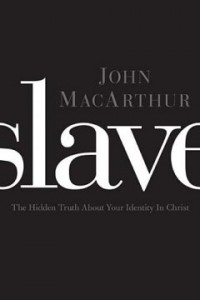BOTW: Slave
Now that I’m 8 weeks into the book reading journey, I’ve decided I probably need a list with the books I’ve read so that you don’t have to be bored with these little reviews. You’ll find the link at the top of the blog. It’s appropriately labeled “Book a Week Challenge.” (Wait, or you could just click that link – wow, am I helpful or what??)
Without a doubt, this is the first book I’ve really struggled to finish in a week. Not because it was too difficult to understand, or because it wasn’t written well, or because I had to think too much (although any of those would make it hard to read a book), but because it was a book that should’ve been a pamphlet.
Try to imagine the meeting to determine if this book would be written. What kind of checklist did the publisher go through in order to determine if they should publish the book?
Well-known author? Check. John macArthur has written quite a few best-sellers.
Attention-grabbing title? Check. “Slave” written in bold white text on a black cover should get it picked up by a lot of curious potential readers.
Enough material to fill 212 pages? Ummmm….
There’s the problem. What started somewhere as what was probably a great discussion turned into a book that was, in my opinion, about 200 pages too long. I mean, how many ways can you say
WARNING! SPOILER ALERT!!!!!
that we’re slaves of Christ, not servants (which is the way most modern Bibles translate the Greek word doulos)?
MacArthur does a great job of explaining that our modern English translations have shied away from the stronger word “slave” because of our country’s tragic history with slavery and racism, but after the first 12 pages or so, I had gotten the point that servants have choices and slaves do not. I don’t think the remaining pages helped to add much more to the discussion (other than the fact that it did provide MacArthur plenty of space to drive home the main tenants of Reformed Theology).
Now, a few snippets:
Submission to the lordship of Christ – a heart attitude that works itself out in obedience to Him – is the defining mark of those who are genuinely converted. (p. 46)
In speaking of being freed from the slavery of sin to become slaves of righteousness, MacArthur quotes Murray Harris:
One of the classic Christian paradoxes is that freedom leads to slavery and slavery leads to freedom. (p. 140)
A slave only fears the master’s return if he has been unfaithful. (p. 183)







Leave a Comment